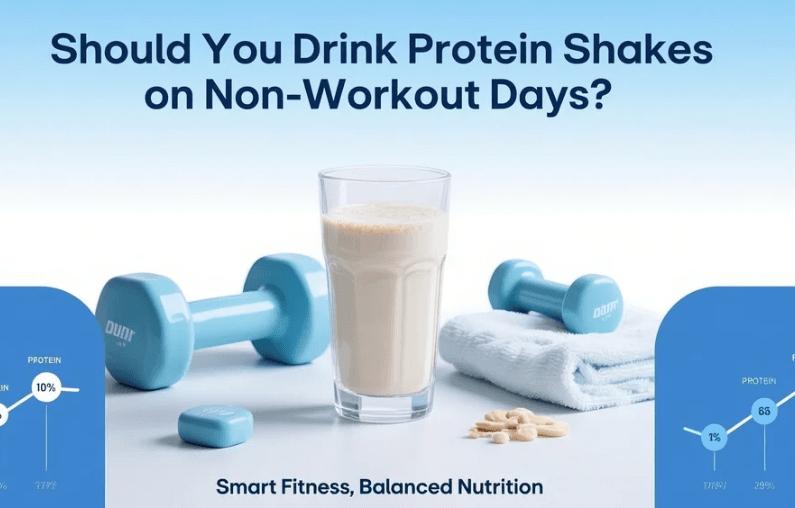Should You Drink Protein Shakes on Non-Workout Days? The Science-Based Answer
Protein shakes have become a staple in many fitness enthusiasts' diets, but confusion remains about their role on days when you're not actively training. The human body undergoes continuous muscle protein synthesis and breakdown, regardless of workout schedules.
Research from the Journal of the International Society of Sports Nutrition reveals that muscle recovery actually continues for 24-48 hours after exercise, making protein intake on rest days crucial for optimal repair and growth.
Muscle protein synthesis rates remain elevated during recovery periods, though slightly lower than immediately post-workout. A 2023 study published in Frontiers in Nutrition demonstrated that maintaining consistent protein intake across both training and non-training days resulted in 22% greater muscle hypertrophy over 12 weeks compared to only emphasizing workout-day protein consumption.
Daily Protein Requirements for Active Individuals
The American College of Sports Medicine recommends 1.4-2.0 grams of protein per kilogram of body weight daily for individuals engaged in regular exercise. This requirement doesn't fluctuate significantly between workout and rest days because:
- Muscle repair continues throughout recovery periods
- Protein supports immune function and enzyme production
- Amino acids help maintain lean mass during calorie deficits
For a 180-pound (82 kg) athlete, this translates to 115-164 grams of protein daily, whether training or resting. Spreading this intake evenly across 3-5 meals appears most effective for maximizing muscle protein synthesis according to recent research in Sports Medicine.
Benefits of Protein Shakes on Rest Days
Incorporating protein shakes during recovery days offers several advantages:
- Convenience: Provides quick, easily digestible protein when whole food options aren't available
- Muscle Preservation: Helps prevent muscle breakdown during periods of reduced activity
- Nutrient Timing: Can help maintain consistent protein intake throughout the day
- Calorie Control: Offers a low-carb option for those managing energy intake
A 2024 meta-analysis in the European Journal of Clinical Nutrition found that individuals who maintained protein supplementation on rest days experienced better maintenance of lean mass during deload weeks and off-seasons.
Potential Drawbacks to Consider
While generally beneficial, protein shakes on non-workout days may present some considerations:
Digestive Sensitivity: Some individuals report bloating when consuming protein powders without accompanying exercise
Caloric Impact: Unnecessary calories if total protein needs are already met through whole foods
Cost: Regular supplementation can become expensive over time
Nutrient Diversity: Over-reliance may reduce the intake of other valuable nutrients from whole foods
The BodyWave app helps track protein intake and timing, ensuring you meet but don't exceed your individual requirements. It's smart algorithms analyze your workout data and recovery patterns to provide personalized protein recommendations for both training and rest days.
Optimal Protein Timing on Recovery Days
Emerging research suggests slight modifications to protein timing on non-training days:
Morning: 20-30g protein to break the overnight fast
Midday: 20-40g protein to maintain muscle protein synthesis
Evening: Casein protein before bed for sustained amino acid release
A 2023 study in the Journal of Nutrition showed this distribution pattern optimized muscle protein balance throughout 24-hour recovery periods.
Whole Food vs. Shake Protein Sources
While shakes offer convenience, whole food proteins provide additional benefits:
Whole Foods:
Contains co-factors like zinc and B vitamins
Provides dietary fiber
Offers greater satiety
Contains bioactive compounds
Protein Shakes:
Fast absorption
Precise dosing
Low-calorie option
Easy post-workout delivery
The ideal approach combines both sources strategically based on your schedule and needs.
Special Considerations for Different Goals
Weight Loss:
Protein shakes can help maintain muscle while in a calorie deficit
May replace higher-calorie snacks
Focus on low-carb, low-fat options
Muscle Gain:
Slightly higher protein intake on rest days may be beneficial
Casein protein before bed supports overnight recovery
Consider adding carbohydrates to shakes for glycogen replenishment
Endurance Athletes:
Protein supports connective tissue repair
Helps mitigate muscle damage from volume training
Combine with antioxidants for enhanced recovery
Practical Recommendations
For most active individuals, these guidelines apply:
- Consume 0.7-1.0g of protein per pound of lean body mass daily
- Maintain consistent intake across all days of the week
- Use shakes when convenient or when whole food isn't practical
- Prioritize whole food sources for the majority of intake
- Time protein evenly throughout the day in 3-5 doses
The BodyWave app's nutrition tracking features help implement these recommendations seamlessly, with automatic adjustments based on your training schedule and recovery metrics.
Common Myths About Rest Day Protein
Myth: Protein only matters on workout days
Truth: Muscle repair continues for 24-48 hours post-exercise
Myth: Extra protein turns to fat on rest days
Truth: Excess calories from any macronutrient can contribute to fat gain
Myth: You must drink shakes to get enough protein
Truth: Whole foods can meet all protein needs when planned properly
Myth: Protein timing doesn't matter on rest days
Truth: Even distribution throughout the day appears most effective
Signs You're Not Getting Enough Protein on Rest Days
Watch for these indicators of potential protein insufficiency:
Prolonged muscle soreness between workouts
Difficulty maintaining strength levels
Increased frequency of illness
Slow recovery from minor injuries
Changes in body composition (losing muscle mass)
Sample Rest Day Protein Plans
Weight Loss (150 lbs individual):
Breakfast: 3 eggs + vegetables (21g)
Snack: Greek yogurt (17g)
Lunch: Chicken salad (35g)
Shake: Plant-based protein (25g)
Dinner: Salmon + quinoa (30g)
Total: 128g protein
Muscle Gain (180 lbs individual):
Breakfast: Omelet + toast (30g)
Shake: Whey protein (30g)
Lunch: Beef stir-fry (40g)
Snack: Cottage cheese (25g)
Dinner: Pork chops + sweet potato (35g)
Casein shake before bed (25g)
Total: 185g protein
Conclusion: A Balanced Approach Wins
Scientific evidence clearly supports the value of maintaining adequate protein intake on non-workout days. While whole food sources should form the foundation of your nutrition plan, protein shakes offer a practical solution for ensuring consistent intake during recovery periods.
The optimal approach considers your individual goals, training schedule, and dietary preferences while maintaining focus on overall protein sufficiency rather than day-to-day fluctuations.
By tracking your protein intake and recovery metrics through BodyWave, you can make data-driven decisions about when and how to incorporate protein shakes into your routine. Remember that nutrition consistency across both training and rest days forms the foundation of long-term progress, regardless of your specific fitness objectives.






BodyWave: Invest in Your Well-being!

